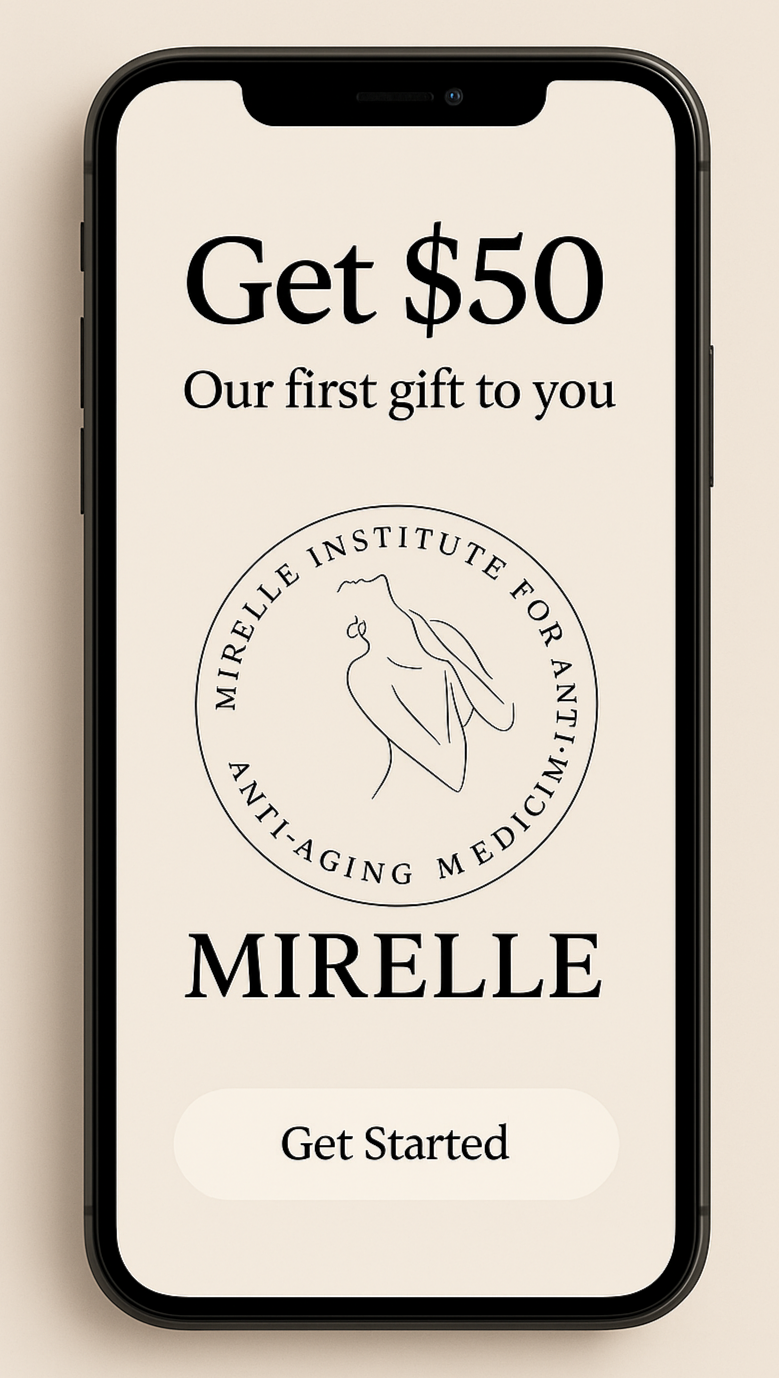The Hidden Link: How Leaky Gut Impacts Your Skin, Mood & Longevity
About the Author
Dr. Corina Ianculovici, DNP, FAAMFM, ABAAM-HP, is a board-certified advanced practice clinician specializing in
longevity medicine, metabolic health, and hormone optimization and functional aesthetics.
She is the founder of Mirelle Institute for Anti-Aging Medicine in New Jersey.
The Hidden Link: How Leaky Gut Impacts Your Skin, Mood & Longevity
What is “leaky gut” (in plain English)?“Leaky gut” is the lay term for increased intestinal permeability. Your gut lining is a smart filter—letting nutrients in, keeping irritants out. When that filter gets inflamed or damaged, its “tight junctions” loosen, and small unwanted particles (like lipopolysaccharides/toxins, food fragments, and microbes) can slip into the bloodstream. Your immune system sees them and mounts an inflammatory response that can ripple through the whole body—skin included, and even the brain via the gut–brain axis. Scientists measure this permeability directly; it’s a real, studied phenomenon. PMCWhat drives leaky gut & dysbiosis (microbiome imbalance)?1) Ultra-processed foods & additivesUPFs (think packaged snacks, sweetened drinks, fast foods) shift the microbiome, inflame the gut, and loosen the barrier, independently of total calories. Emulsifiers and some additives can thin the mucus layer and disturb microbes; high-sugar patterns do the same. Large cohort data also link high UPF intake with higher depression risk, highlighting gut–brain connections. JAMA Network2) Low fiber, low plant diversityFiber is fermented by gut bacteria into short-chain fatty acids (SCFAs)—especially butyrate, which is fuel for colon cells and helps tighten the gut barrier and calm inflammation. Diets low in fiber and variety reduce SCFAs and weaken the barrier. PMC3) Hidden sugars & chaotic eatingFrequent spikes from added sugars and irregular meal timing can promote microbial shifts and inflammatory signals that aggravate permeability. (Mechanistic and clinical reviews tie specific diet components to barrier changes.) Physiology Journals4) Lectins (a balanced view)Some plant lectins (e.g., wheat germ agglutinin) can bind gut cells and alter barrier behavior in vitro and in certain contexts; gliadin (a wheat protein) can increase permeability in susceptible people. For most people eating whole, cooked legumes/grains within a diverse diet, lectins are typically tolerated—proper soaking/cooking lowers activity. The evidence in everyday, healthy humans is mixed, so personalization is key. PMCHow leaky gut shows up on your skin (the gut–skin axis)When microbial balance and barrier integrity falter, immune messengers and microbial metabolites change—this can flare acne, eczema, and psoriasis or slow healing and dull the complexion. Reviews of the gut–skin axis link dysbiosis and barrier problems with common inflammatory skin conditions and suggest targeted dietary approaches can help. spandidos-publications.com, FrontiersHow it affects mood, focus & resilience (the gut–brain axis)Your gut and brain “talk” via nerves (vagus), hormones, immune signals, and microbial metabolites (like SCFAs). Dysbiosis and a leaky barrier can amplify systemic inflammation and alter neurotransmitter pathways—raising anxiety, brain fog, and depression risk. Landmark reviews and prospective studies support these links; importantly, improving diet quality can reduce depressive symptoms in randomized trials. Physiology JournalsEveryday culprits (and what to swap)-Processed snacks & sweetened drinks → swap for whole foods, sparkling water, herbal teas. BMJ-Low-fiber routines → add legumes, oats, nuts, seeds, veggies, and diverse fruits to feed SCFA-producing microbes. PMC-Monotonous diets → aim for 30+ different plants/week for microbial diversity (even spices/herbs count). ScienceDirect-Frequent “grazing on sugar” → move toward regular meals with protein + fiber to stabilize the microbiome. Physiology Journals-Lectin sensitivity (if suspected) → prefer soaking/sprouting/pressure-cooking legumes; consider a time-limited trial reduction with re-challenge, guided by a clinician. ScienceDirectHow we fix this—Metabolic Code® + Functional Consultation at MirelleAt Mirelle Institute for Anti-Aging Medicine (Wall Township/ Manasquan, NJ), we tackle leaky gut and dysbiosis with a personalized, two-pronged systems-based approach:1. The Metabolic Code® Assessment: A structured, evidence-informed analysis of your metabolic and inflammatory patterns that becomes your personal blueprint for gut repair, energy, mood, and skin vitality.2. The Functional Medicine Consultation: Uncover the Root Cause. Rebalance Your Body. Restore VitalityA Functional Medicine Consultation is more than a visit — it’s a deep dive into your body’s story.Rather than chasing symptoms, we look upstream to identify the *root causes* of imbalance — whether hormonal, metabolic, nutritional, inflammatory, or environmental.At Mirelle Institute for Anti-Aging Medicine, our consultations integrate cutting-edge diagnostics, personalized nutrition, and advanced lifestyle medicine to create a unique wellness roadmap designed just for you.What to Expect?Your journey begins with a comprehensive health assessment that includes:1. Detailed Health & Lifestyle HistoryWe explore your energy, sleep, stress, digestion, hormones, medications, food choices, and environmental exposures — painting a complete picture of your health.2. Symptom & System MappingUsing the Functional Medicine Matrix and (optionally) the Metabolic Code® Assessment, we identify which biological systems are under stress — such as inflammation, mitochondrial dysfunction, or hormonal imbalances.3. Advanced Diagnostic Testing (as needed)Depending on your symptoms, we may order targeted labs including:* Gut microbiome analysis or food sensitivity testing* Hormone & adrenal panels* Micronutrient or inflammation markers* Metabolic & insulin sensitivity assessments4. Personalized Plan of CareYou’ll receive a structured plan that may include:* Customized nutrition and meal timing* Peptide or nutraceutical support* Stress-reduction and sleep optimization* Detoxification or gut-healing protocols* Fitness and recovery strategies based on your metabolic type5. Follow-Up & OptimizationWe track your progress, refine your plan, and provide ongoing education so you can sustain long-term results and feel empowered in your health decisions.
Why It Works?
Functional Medicine bridges traditional medicine and precision wellness — combining evidence-based science with an individualized approach.By uncovering what’s driving your fatigue, inflammation, or hormonal imbalance, we can create targeted interventions that restore equilibrium and optimize longevity.Peer-reviewed studies consistently show that lifestyle and functional interventions—including diet diversity, gut repair, and stress management—improve biomarkers of inflammation, metabolic health, and mental well-being (Frontiers in Public Health, 2023; JAMA Network Open, 2024).
Ideal For:
* Chronic fatigue or “burnout”* Hormonal imbalances (PMS, menopause, andropause)* Brain fog, anxiety, or mood changes* Digestive symptoms (bloating, reflux, IBS, leaky gut)* Weight-loss resistance or metabolic slowdown* Autoimmune or inflammatory conditions* Skin issues linked to internal inflammation
Your Personalized Wellness Roadmap Awaits
When you understand how your unique biology works, you can finally feel — and look — like your most vibrant self.✨ Book your Functional Medicine Consultation today and begin your journey toward total health transformation.
1. An anti-inflammatory, high-fiber, diverse whole-foods template (often Mediterranean-style) shown to improve depressive symptoms and support the gut barrier. BioMed Central
2. Strategic re-introduction/elimination when needed (e.g., emulsifiers, excess sugars; careful handling of lectins). PMC
3. Targeted nutrients (prebiotic fibers; polyphenol-rich plants) that encourage SCFA production and barrier integrity. PMC
✨ Curious what your blueprint looks like?
Start with the Metabolic Code® Assessment and we’ll map your gut–skin–brain connections, step-by-step.
References:
- Camilleri M. Leaky gut: mechanisms, measurement and clinical implications in humans. Gastroenterology review. PMC
- Cryan & Dinan. The Microbiota-Gut-Brain Axis. Physiol Rev; mechanistic overview. Physiology Journals
- Samuthpongtorn et al. Ultraprocessed foods & depression risk. JAMA Netw Open cohort. JAMA Network
- Salem et al. Gut microbiome & skin disorders (acne, AD, psoriasis). Front Microbiol review. Frontiers
- Pérez-Reytor et al. SCFAs and gut barrier/healing. Int J Mol Sci review. PMC
- AJP-GI review on dietary components and permeability. Physiology Journals
- WGA/lectins mechanistic evidence.









